The excitement surrounding the forthcoming film “28 Years Later” marks a significant return to the iconic zombie franchise, following the earlier installments “28 Days Later” (2002) and “28 Weeks Later” (2007). Directed by Danny Boyle, who re-teams with writer Alex Garland for this new entry, the film is poised to be released in theaters on June 20. This collaboration with Garland has yielded a unique perspective on the narrative, which will also provide commentary on contemporary issues such as Brexit.
In a recent presentation in Rome, Boyle humorously stated that they are “looking for funding” for the third film in this new trilogy. He emphasized that they only revisited this project when Garland presented a compelling idea worthy of continuation. A notable aspect of “28 Years Later” is its commentary on family dynamics, set against the backdrop of an isolated community inhabited by people attempting to navigate a world filled with monstrous threats.
The film features Jodie Comer and Aaron Taylor-Johnson as a married couple, alongside Alfie Williams as their son, Spike. Boyle notes that Spike’s journey encapsulates the film’s overarching narrative, which seeks to explore the evolution of familial relationships amidst societal upheaval. Reflecting on the traditional values reminiscent of 1950s England, Taylor-Johnson’s character desires his son to conform to these roles, but Spike’s quest for identity signifies a broader pursuit of progress.
Boyle also praised rising young actors like Williams, attributing their preparedness to influences from successful franchises like Harry Potter, which have inspired a generation to pursue acting. The film’s setting has been thoughtfully adjusted for a post-COVID world, with Boyle acknowledging that the pandemic has altered societal perspectives on survival and risk-taking.
Technological innovation plays a significant role in “28 Years Later,” with Boyle utilizing modern tools such as iPhones and drones to capture visually striking imagery in natural landscapes. His intention is to create something fresh that departs from the previous film’s aesthetic while embracing contemporary advancements in filmmaking.
When discussing current global issues, Boyle expressed concern about the lack of inspirational figures in leadership. He highlighted the importance of independent media, specifically the BBC, as a critical entity that provides factual and unbiased news. The film not only explores the horrors of a fictional pandemic but also reflects on the real-world challenges and monsters that society faces today.
This blending of themes makes “28 Years Later” more than just a horror film; it serves as a mirror reflecting both personal and societal transformations in the context of an evolving world. The narrative promises to resonate with audiences, providing a hopeful message of growth and resilience amid chaos.
